Sacred Solitude: Inside the World of Greek Orthodox...
Keepers of stillness and prayer in...
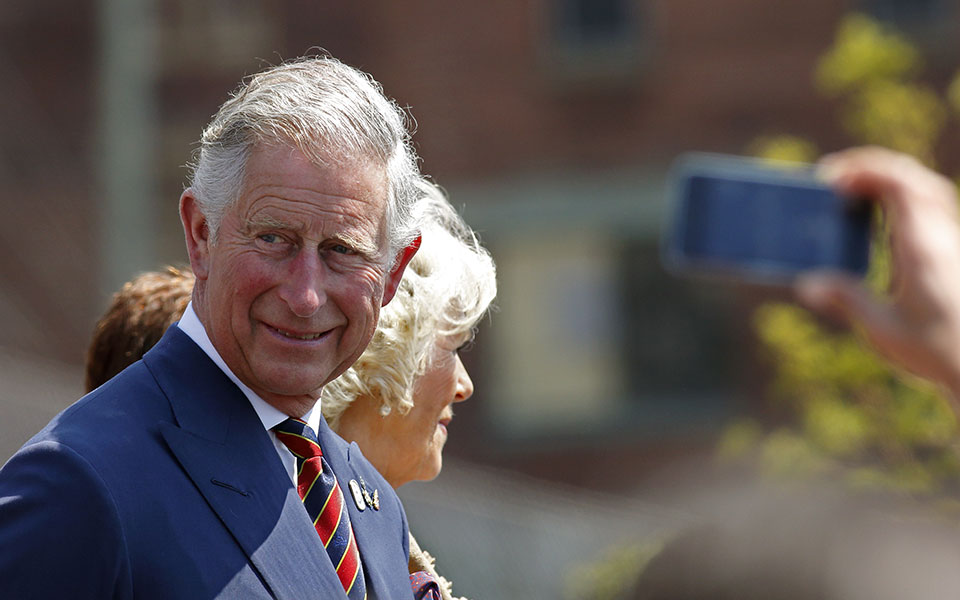
Drawn to the rugged spirituality of Greek Orthodoxy, the new King knows Greece well. His life-long association with country, as well as his charitable endeavors, will surely continue.
© Shutterstock
The death of Queen Elizabeth II on September 8, just three months after her unprecedented Platinum Jubilee, sent shock waves around the world. Irrespective of what one thinks about the institution of monarchy, she was undeniably an extraordinary woman, a national matriarch (mother, grandmother, great-grandmother) whose long reign and selfless devotion to duty provided stability and inspiration; an anchor of constancy over the course of 70 years of epochal changes.
In the words of John Kittmer, chair of the Anglo-Hellenic League and the United Kingdom’s ambassador to Greece from 2013 to 2016, the Queen was “an impeccable constitutional monarch in an open, democratic age.” For millions of people in the UK, the 56 nations of Commonwealth, and indeed around the world, Queen Elizabeth II was the Queen, and her passing at the age of 96 has brought about a profound sense of loss. Amid the public outpouring of grief and the closely choreographed pageantry over the past weeks, a new monarch has taken his place as the head of state, HRH King Charles III.
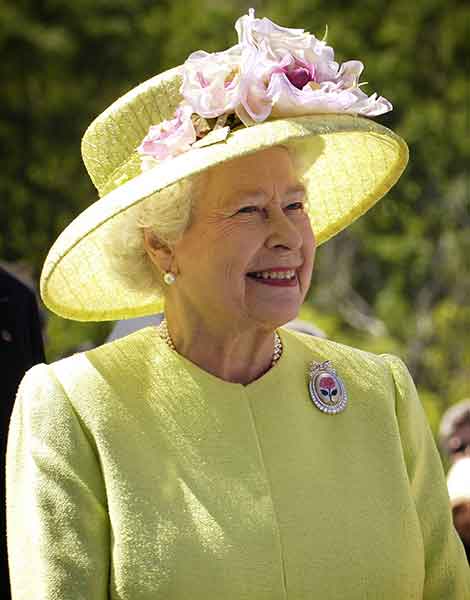
Charles' mother, Queen Elizabeth II, was the longest reigning monarch in British history.
© Shutterstock
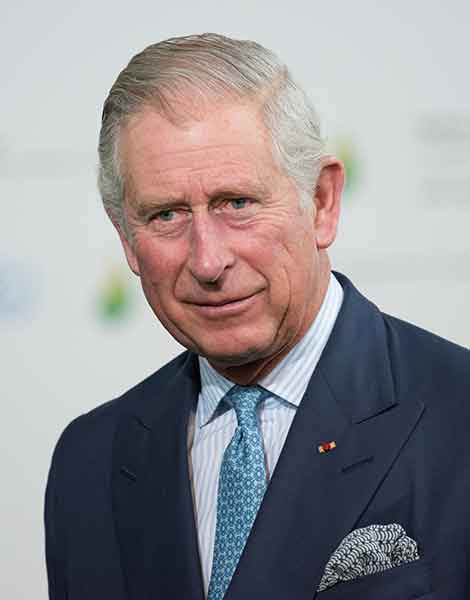
A passionate environmentalist, the then Prince of Wales attended the Paris COP21 in 2015, the UN’s conference on climate change.
© Shutterstock
We know a good deal about the new King’s views on organic farming, architecture, and the natural environment, and his passion for philanthropy – as Prince of Wales, he established the Prince’s Trust, raising over 100 million British Pounds annually for charitable endeavors related to youth education, the arts, heritage, and environmental sustainability. We also know that he has a deeply rooted affection for Greece, its people, age-old culture and history, and, especially, its Christian Orthodox faith. But where does all this stem from? And what can we in Greece expect from the reign of King Charles III?
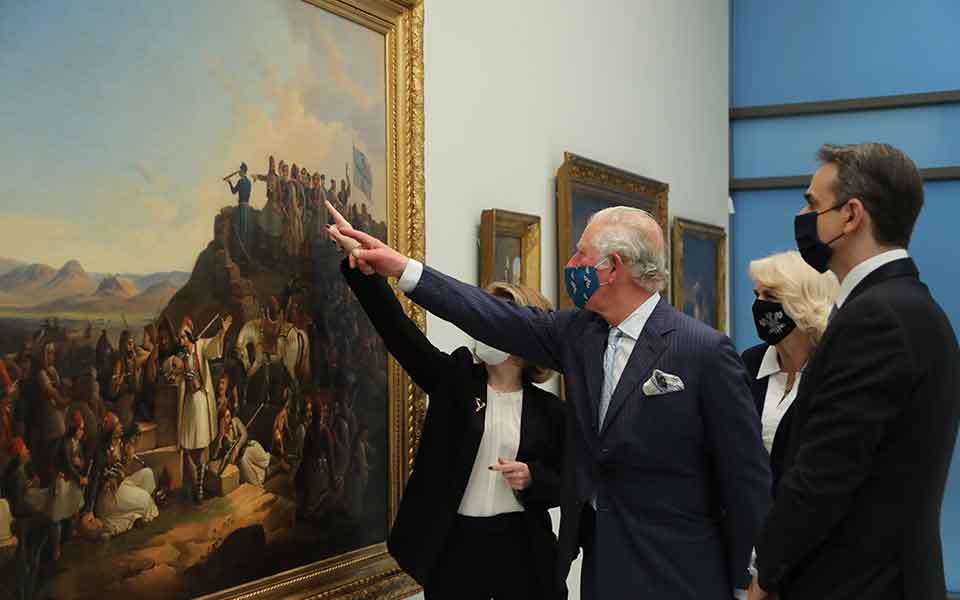
Athens, March 2021 - 200 years after the Greek Revolution, Charles, Prince of Wales, Camilla, Duchess of Cornwall, and Greek Prime Minister Kyriakos Mitsotakis visit the newly-opened National Gallery of Greece.
© Shutterstock
2021 was a symbolic year for Greece. Commemorating the 200th anniversary of the start of the 1821 uprising that would lead to independence, Greeks celebrated with a series of spectacular events, flypasts, and parades. In the early morning of March 25, as the Blue and White flag was raised over the ancient Acropolis, prime minister Kyriakos Mitsotakis proclaimed: “Two centuries ago, a handful of determined fighters in and outside Greece raised the banner of independence … with the help of their allies they fought heroically and won their freedom.”
The allies he spoke of were Great Britain, France and Russia, whose support in the near decade-long struggle proved pivotal. On October 20, 1827, in what historians have described as “the last great battle of the age of sail,” a combined allied fleet routed the Ottoman and Egyptian forces in Navarino Bay, which made victory for the Greek cause, in the face of near impossible odds, far more likely.
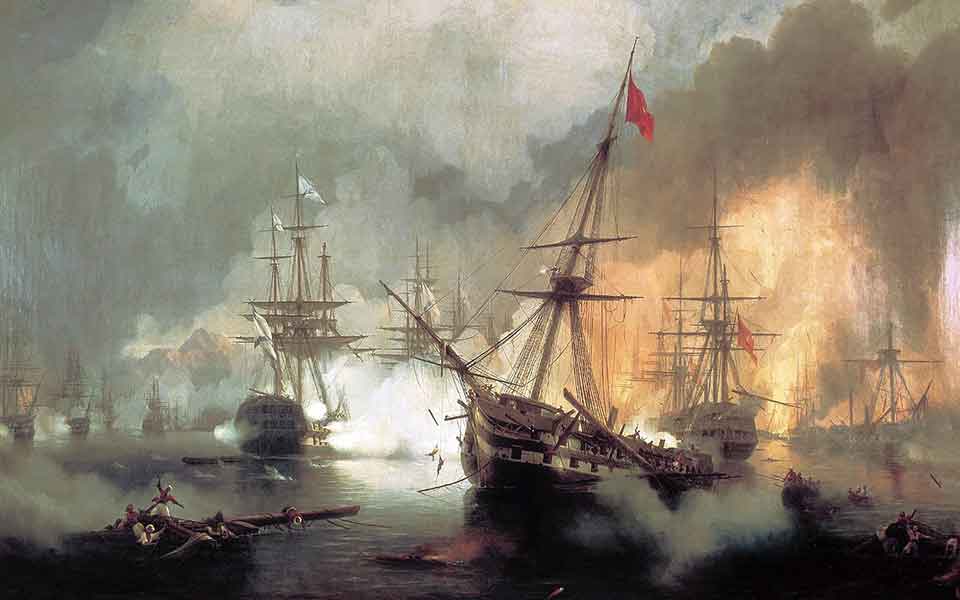
The Battle of Navarino, painting by Ivan Aivazovsky
Representing Britain at the Independence Day parade in Athens last year was Charles, the then Prince of Wales, who, accompanied by his wife Camila, the Duchess of Cornwall, became visibly emotional as the Greek military played “God Save the Queen” at a wreath-laying ceremony before the Tomb of the Unknown Soldier.
“My wife and I could not be more delighted to be back in Greece, which has long held the most special place in my heart,” he told dignitaries at an official state dinner, hosted by the president of the Hellenic Republic. He went on to praise “the extraordinary courage and fortitude” exhibited by Greeks during the 1821 revolution and of his own “profound connection” to the country.
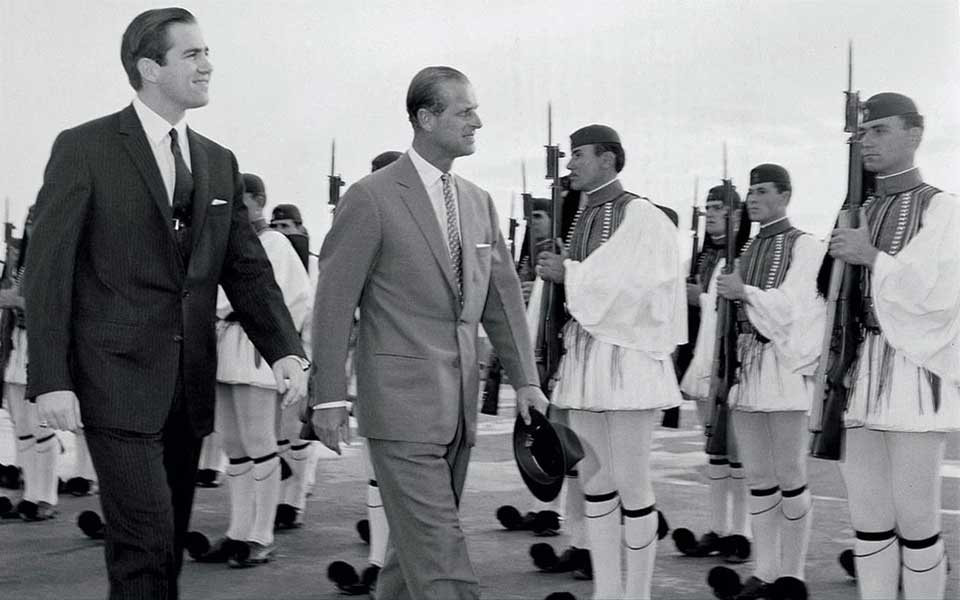
Charles' father, Prince Philip, Duke of Edinburgh, with his first cousin King Constantine II of Greece inspecting an honor guard of Evzones at Athens airport, March 1965.
© AP Photos
Prior to his official visit last year, Charles and Camila visited Greece in May 2018 against the complex backdrop bilateral negotiations following Britain’s impending departure from the European Union. During the three-day tour, he expressed his heartfelt affection for the country, “the land of my grandfather; and of my father’s birth.”
“Apart from anything else, Greece is in my blood, and I have long had a fascination for her ancient culture and history,” he told Kathimerini during the visit. “I have been so fortunate to have visited some of Greece’s many beautiful and unique places.”
Charles’ father, Prince Philip, Duke of Edinburgh, who passed away at 99 on April 9, 2021, was born at the palace of Mon Repo on the island Corfu. The fifth child of Prince Andrew of Greece and Denmark and Princess Aliki (Alice) of Battenberg, and baptized in the Greek Orthodox church, the young Philip’s grandparents were King George I and Queen Olga of Greece. Following the Asia Minor Crisis of 1922, and his father’s subsequent banishment, the family was forced to flee the country. It is said that the young prince was placed in a wooden fruit box during the hasty evacuation.
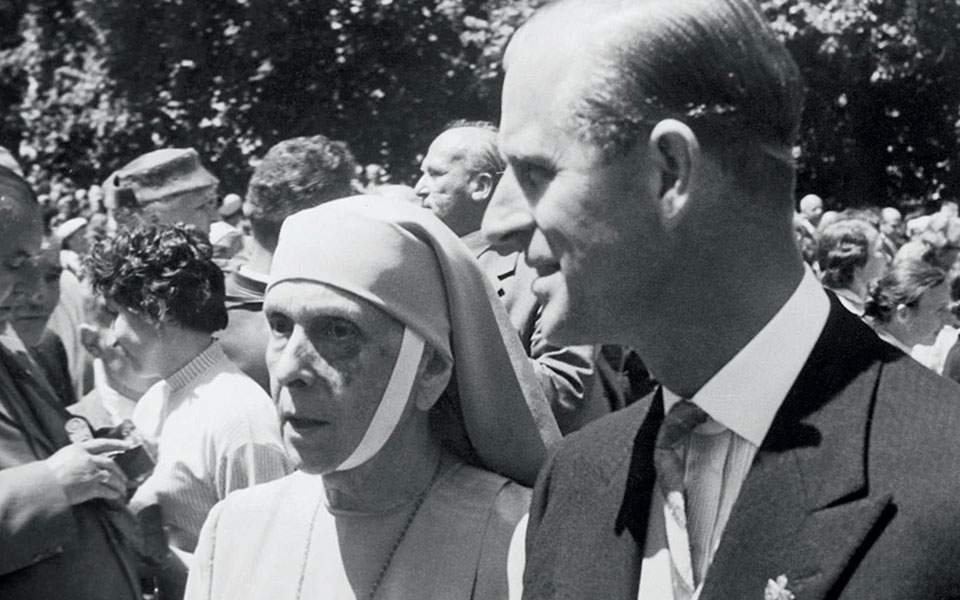
Charles' grandmother, Princess Alice of Battenberg, with her son Prince Philip.
© AP Photos
Philip’s mother, diagnosed in 1930 with schizophrenia and committed to a sanatorium in Switzerland, later returned to Greece and devoted the rest of her life to charity. She remained in Athens during World War II, sheltering Jewish refugees and distributing rations, and went on to establish an Orthodox nursing order of nuns known as the Christian Sisterhood of Martha and Mary.
At last year’s events, Charles spoke of the enduring affection for his grandmother: “It was in Athens that my dear grandmother, Princess Alice, during the dark years of Nazi occupation, sheltered a Jewish family – an act for which in Israel she is counted as ‘Righteous Among the Nations’.”
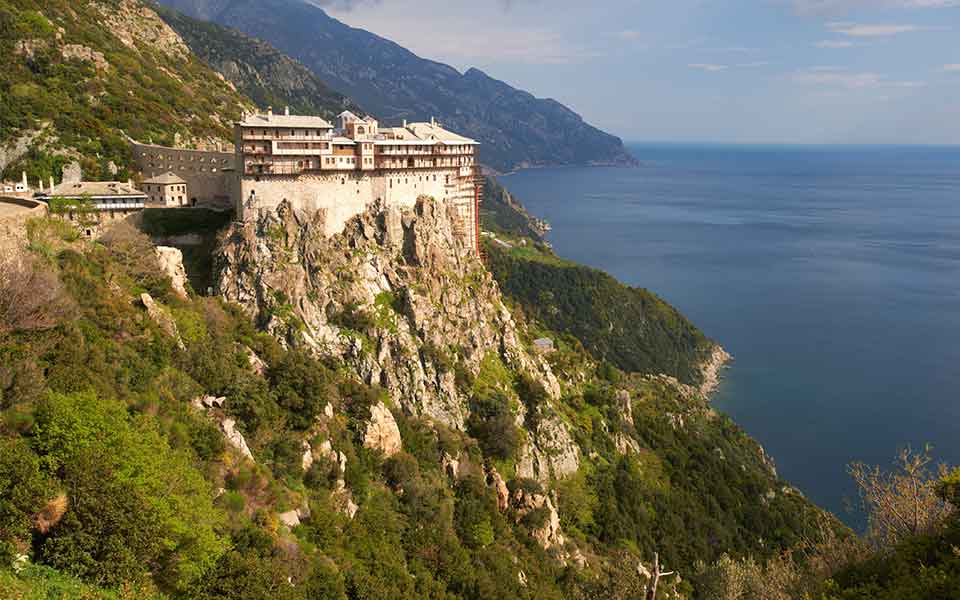
Simonos Petras Monastery amid the rugged beauty of Mount Athos
© Shutterstock
There has been much speculation about the new King’s relationship with Greek Orthodoxy over the years. As the Prince of Wales, he was a frequent visitor to the all-male monastic republic of Mount Athos (the Holy Mount) in northern Greece – the holiest site in the Orthodox world – where, tucked away from world, it is said he found much-needed peace and spiritual serenity amid its rugged natural beauty.
Following a visit in May 2004, one Athonite monk confided: “There is no question that the British royal is Orthodox in his heart. Sadly, he is very constrained by his position.” Prior to the visit, one of the monasteries – the Monastery of Chelandari – was badly damaged by a fire. The then prince launched the idea of creating the “Friends of Mount Athos” in Britain, which raised funds for its restoration.
Throughout his life, Charles has displayed an unprecedented interest in world religions, including Islam, Buddhism, and other denominations of Christianity, but his relationship with Orthodoxy is both deep and profoundly meaningful – a section of his royal estate at Highgrove, Gloucestershire, is adorned with Byzantine icons, many believed to be gifts from the monks at Mount Athos.
Now that he assumes the role of Head of the Church of England, Defender of the Faith, the new King has reaffirmed his commitment to interfaith dialogue and harmony among people of different religions in an increasingly multicultural Britain. A staunch supporter of religious freedom, it seems unlikely that he will relinquish his intellectual and spiritual commitment to Greek Orthodoxy.
Ephraim, abbot of Vatopedion on Mount Athos – Charles’ adopted monastery – has been a frequent visitor to Highgrove over the years, instructing him in eastern Christianity. In a statement to The Guardian in 2004, Archbishop Grigorios of Thyateira, who heads the 500,000-strong Orthodox community in Britain, reminded readers that “Orthodoxy is in his family.”
“One of Charles’s aunts, the Grand Duchess Eugenia, was proclaimed an Orthodox saint after she was murdered in Moscow where she had established a monastery. His paternal grandmother, Aliki [Alice], was a nun for most of her life. She spoke very good Greek and in her later years, when she came to live in London, she kept an Orthodox chapel in Buckingham Palace,” added the prelate. “Aliki was a very powerful woman whom I’m sure had a very strong influence on Charles in his early years.”
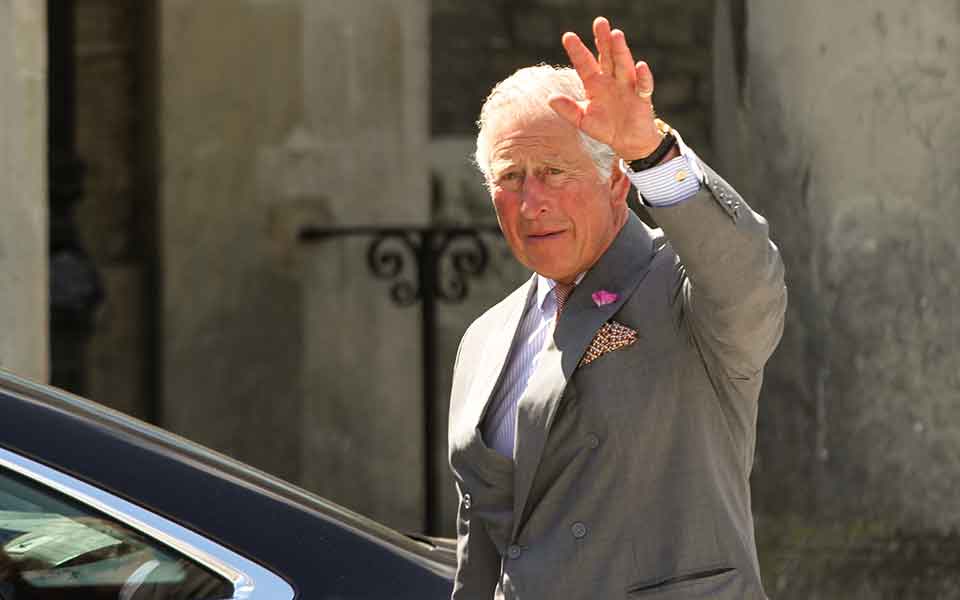
The Prince's Trust International is providing support to more than two thousand unemployed young people in Greek cities.
© Shutterstock
While Queen Elizabeth did not visit Greece again during her 70-year reign, it was said that she was deeply concerned about the Greek people during the decade-long economic crisis. Her son Charles, however, beyond his keen interest in Greek Orthodoxy, has personally reached out to help the country’s unemployed youth.
Founded in 2015, the Prince’s Trust International – the global version of the UK charity he set up in 1976 to support vulnerable young people – has a strong presence in Greece. Over the course of a five-year program, the Trust aims to support more than 2,200 young people (18 to 30-year-olds) in Athens and other cities in Greece to train in key skills and find employment.
During his visit in 2018, he spoke of the initiative: “Knowing that Greece, and so many Greeks, have been going through such a very difficult time in recent years, I wanted to find a way – however small and inadequate – to help the young people of Greece achieve their full potential, whether through skills training or assisting them to set up their own enterprises”
At a formal reception at St James’s Palace in London in 2019, the then Prince of Wales welcomed Greek beneficiaries of the program alongside prominent Greeks in Britain’s business world. In fluent Greek, he said: “Together, we can help the young people of Greece to build a brighter future for themselves and their country.”
It would seem that the newly ascended King Charles III’s close personal connection to Greece is set to continue long into the future.
Keepers of stillness and prayer in...
From a mysterious Minoan structure to...